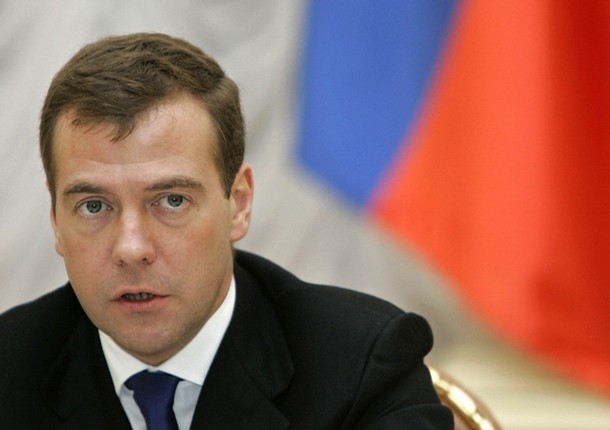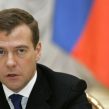
MEDVEDEV’S ADDRESS IS RETURNED FOR REVISIONS
Publication: Eurasia Daily Monitor Volume: 5 Issue: 205
By:

A major presidential performance had been scheduled for last week in the Kremlin, but it was postponed indefinitely at the last possible moment and without any convincing explanation. President Dmitry Medvedev was due to present his first annual address to the Federal Assembly on October 23, but the day before the grand event the invitations were cancelled (Kommersant, www.gazeta.ru, October 23). The official line is that the changing economic situation had required some re-evaluation and that Medvedev is personally working with the text on a daily basis and intends to deliver it perhaps as soon as this week (www.lenta.ru, October 23).
The situation in the Russian economy is indeed deteriorating fast, and the fall of the RTS stock market index from the May peak of 2,500 to the level of 550 last week is only the most visible indicator (www.rbc.ru, October 24). The picture painted by state propaganda remains nevertheless moderately optimistic, as officials stick to three key theses: a) the great distortions in the U.S. economy caused some “difficulties” in Russia; b) the massive reserves accumulated in the years of plenty are now wisely being used by the government to minimize these external impacts; and c) only some greedy bankers are going to suffer, while the population at large has nothing to fear. It was entirely possible for Medvedev to elaborate on this discourse and enjoy an ovation from the servile parliamentarians. The embarrassing cancellation of the “landmark” address indicates, however, that he wanted to say something else and was firmly overruled (Ezhednevny zhurnal, October 24).
There is only one man in Russia who could have told Medvedev to think twice, and this man indeed has serious reasons for cutting short any deviation from the “party line.” Many respected economists in Russia, including Egor Gaidar and Evgeny Yasin, are drawing attention not to the uncontrollable forces of globalization but to mistakes in Russia’s economic policy that have aggravated its vulnerability (The New Times, October 20; Moscow Echo, October 24). Other experts, such as Sergei Aleksashenko and particularly Andrei Illarionov, argue that the government’s emergency measures are actually driving the dynamics of the crisis (www.polit.ru, October 7; www.gazeta.ru, October 2). Yet other dissidents, like Mikhail Delyagin, point to the specific features of the crisis that directly affect society, for instance the massive firing in the construction industry of the so-called Gästarbeiter or illegal labor migrants mostly from Central Asia, who must be repatriated in order to avoid a sharp rise in crime (Ezhednevny zhurnal, October 21).
All these voices are lines in a long rhyme that invariably ends with the reference “… in the house that Jack built,” and everybody in Russia knows who the architect in question is. That Vladimir Putin has never been able to admit a mistake is only part of his motivation for stonewalling the analysis of the unfolding disaster. A greater part of this determination comes from the need to keep the system of unaccountable redistribution of financial resources going for as long as possible, while the key players seek to compensate their colossal and totally unexpected losses.
Two features of this desperate looting of fast-shrinking reserves came into sharper focus last week. First was the mind-boggling scale of the external indebtedness of Russian companies, not only of all state-owned energy giants like Gazprom and Rosneft but also private “oligarchic” empires close to the Kremlin. The sharp fall of their market capitalization has triggered many “margin calls” for repaying the borrowed money since the collateral has lost value. As a result, Russian “champions” have to pay back up to $210 billion by the end of 2009 (The New Times, October 20). The political decision to rescue the loyal entrepreneurs by providing $50 billion for refinancing their foreign debts can solve some immediate problems, but the applications have already exceeded the designated sum, and many investment programs that are supposed to support Russia’s continuing growth, for instance in the newly-privatized electricity sector, have been gutted.
The second feature is the spectacular increase in corruption schemes and channels in the emergency situation of siphoning off hard-currency reserves that still amount to half a trillion dollars, which is approximately equal to the corporate debt. The decisions about rescuing banks that are known to be “close” to certain officials and opening credit lines to companies with unknown ownership structures are so opaque that the international financial services company Standard & Poor’s revised its outlook on Russia’s sovereign credit rating from “stable” to “negative” last week (www.newsru.com, 23 October). Corroborating this was Transparency International, which gave Russia its worst mark in eight years, so that in the Corruption Perception Index it now shares 147th place (out of 180) with Bangladesh, Kenya, and Syria (Nezavisimaya gazeta, October 24).
Medvedev quite possibly feels the need to add more substance to his anticorruption initiatives and provide some explanations for the apparent lack of results from the much-advertised interventions. Putin, however, cannot tolerate dissent from his junior partner, since any crack in the monolithic system of power could trigger an avalanche of desertions and revelations that would demonstrate that corruption is not a mere defect in his course of expanding state control over the economy but its core substance. His approval ratings may still remain high; but the social contract of “Putinism,” according to which the population enjoys the fruits of petro-prosperity while ignoring the shameless thievery of the ruling elite, is about to expire (www.gazeta.ru, October 22). The peculiar two-headed form of leadership was designed by the over-confident “tsar” for presiding over a permanent party of distributing tons of easy money; but it cannot function in the situation of escalating squabbles between elite clans and gathering social discontent. Cutting Medvedev down to size with his address was easy, but now Putin has to decide how much longer he can postpone the hard tasks of managing rather than explaining away the crisis that has transformed his pet projects into toxic assets.




